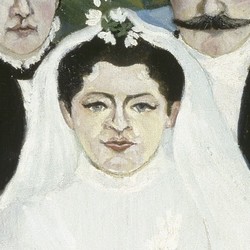
Andante. Andantino. Adagio. Andante molto moderato. These are usual tempo indications in Gabriel Fauré's mélodies, which are usually slow, quiet, intimate songs. Therefore, it is striking to find in a recital a song by Fauré indicated as allegro energico.
The song is Fleur jetée [Discarded flower], and the poem is by a poet that Fauré often put to music, Armand Silvestre. These verses are found in Les ailes d'or [The golden wings, 1890], in the fifth part, Vers pour ètres chantés [Verses to be sung]. If you look at the two songs by Fauré with a poem by Silvester that we heard so far, Notre amour and Le secret, you will notice that there is a pattern in the poems: all the stanzas start with the same words, or the initial verse is repeated, or the end verse is repeated. This gives them a particular rhythm, and Fauré makes good use of it and enhances it with his music. There is also a pattern in Fleur jetée: each of the three stanzas, of six verses each, ends with the two verses that started it. Only in the third stanza, at the end, does the poet make a small but significant change.
The poem depicts the end of a love affair: the flower that witnessed love, picked in a moment of joy, becomes a symbol of loss. Fauré composes a vehement song from the despair of the poetic voice. Every comment we read about Fleur jetée mentions the resemblance to Schubert's Erlkönig, and the chords heard in the accompaniment certainly evoke this Lied. Both songs have a different reason for the desperation, but the short prelude of Fleur jetée leads us to the character of the piece, thanks to Schubert (and Fauré, who chose the motif for some reason). The vocal line begins with forte, impetuously, and during the first stanza it will hardly move from there.
The second stanza presents new themes and begins in piano. It is a brief change of atmosphere because the crescendi will take us back to the forte. Fauré adds repetitions to those already present in the poem, so for practical and musical purposes we have a four-verse stanza entirely repeated. In the third stanza, the vocal line essentially echoes the melody of the first one.Fauré also adds repetitions: after singing "Que le vent qui te sèche" for the second time, the words "O pauvre fleur" are repeated. Then the singer says, for the third time, "Que le vent qui te sèche" and ends with a dramatic "sèche mon coeur". Both the poet's and the composer's repetitions, as well as the nervousness of the accompaniment, and its dissonances, fully convey the anger and disenchantment of the poetic voice. Just as if Fauré had composed such vehement songs his entire life.
However, as we are aware, that was not the case. Fauré composed this song in 1884, when he was about to turn forty, and published it the following year. The collection, Opus 39, had four songs, the first three with a poem by Armand Silvestre; Fleur jetée is the second and only to deviate from the usual calm mood. We don't know (or at least I wasn't able to find the reason) why the composer made such an unusual and unexpected mélodie, but I have to admit I love it. I suggest we listen to it in a splendid version, that of Simon Keenlyside and Malcolm Martineau.
Au gré du vent,
Fleur en chantant cueillie
Et jetée en rêvant.
— Emporte ma folie
Au gré du vent !
Comme la fleur fauchée
Périt l’amour.
La main qui t’a touchée
Fuit ma main sans retour
— Comme la fleur fauchée,
Périt l’amour !
Que le vent qui te sèche,
Ô pauvre fleur,
Tout à l’heure si fraîche
Et demain sans couleur !
— Que le vent qui te sèche,
Sèche mon cœur !
at the whim of the wind,
oh flower which I picked while I sang
and threw away as I dreamed.
- Carry off my folly
at the whim of the wind!
Like flowers scythed down,
love dies.
The hand that once touched you
now shuns my hand forever.
- Like flowers scythed down,
ove dies.
May the wind that withers you,
oh poor flower,
a moment ago so fresh
and tomorrow all faded.
- May the wind that withers you
wither my heart!
(translation by Peter Low)
















